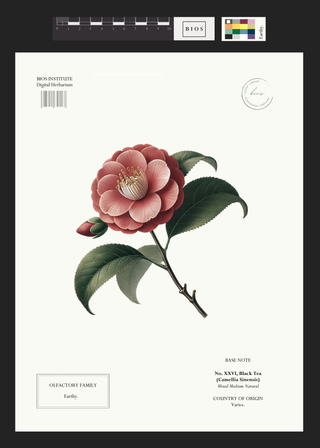

Black tea, derived from the leaves of the Camellia sinensis plant, is an aromatic ingredient that is occasionally used in perfumery to add depth, warmth, and a touch of sophistication to fragrance compositions. Camellia sinensis, the plant from which all true teas (such as green tea, black tea, white tea, oolong tea, and pu-erh tea) are derived, is native to East Asia.
In perfumery, black tea offers a rich, comforting, and slightly smoky aroma. It can provide a sense of warmth and complexity to a fragrance, adding a distinctive nuance that can evoke images of cozy tea rooms or tranquil moments of relaxation. The scent of black tea is often described as earthy, woody, and with subtle floral undertones.
Black tea is a base note and found in our Earthy family. Its aroma tends to be long-lasting and can linger on the skin, enhancing the overall longevity of the fragrance. Black tea blends well with a range of other fragrance ingredients, including spices, woods, florals, and gourmand notes, allowing perfumers to create intriguing and multi-dimensional compositions.
Overall, black tea adds a unique and sophisticated touch to fragrances. Its warm, smoky, and comforting aroma can create a sense of depth and intrigue in perfumes, making it an intriguing ingredient for perfumers seeking to create complex and memorable olfactory experiences.
Black tea is often central to tea ceremonies, which are practiced in different forms in various cultures such as China, Japan, and England. These ceremonies involve the careful preparation and serving of tea, emphasizing mindfulness, tranquility, and the appreciation of tea as a meditative practice. The process of brewing and serving black tea is considered a ritualistic act that promotes connection, reflection, and harmony.
Black tea may be used as an offering to deities, ancestors, or spirits in certain rituals. It is seen as a gesture of respect, gratitude, and hospitality. Offering black tea can symbolize a willingness to connect, share, and create a harmonious atmosphere. In some traditions, black tea is also offered to guests as a welcoming gesture, signifying warmth, friendship, and hospitality.
Black tea is sometimes used in rituals that promote relaxation, meditation, and mindfulness. The act of brewing and sipping tea can be approached as a mindful practice, focusing on the present moment and creating a sense of calm and clarity. Black tea rituals may involve specific preparations, such as the use of special tea utensils or the observance of specific brewing techniques, to enhance the meditative experience.
In certain traditions, black tea is used as a cleansing agent for spiritual and energetic purposes. It is believed to have purifying properties that can help cleanse negative energy, provide protection, and restore balance. Black tea may be used in smudging rituals, where the smoke from burning tea leaves is used to cleanse spaces, objects, or individuals energetically.
In some cultures, black tea leaves are used for divination and fortune-telling practices. The arrangement and interpretation of the tea leaves left after drinking the tea can be used to gain insights, guidance, and predictions. These rituals often involve a specific set of rituals and symbols associated with the reading of the tea leaves.
Black Tea
- Unit price
- /per
Please note this product format is a small vial that contains roughly 20 drops of scent concentrate. This can be purchased à la carte but is intended to be used with our Perfume Kit.
SCENT SPECIFICATIONS
Latin Name: Camellia Sinensis
Extraction Method: Isolate
Country of Origin: Varies
All of the scents in our library our naturally derived - our collection includes essential oils, absolutes, concretes, isolates, enfleurage, macerations, oleoresins, and mixed medium naturals.
Adding product to your cart
Black tea, derived from the leaves of the Camellia sinensis plant, is an aromatic ingredient that is occasionally used in perfumery to add depth, warmth, and a touch of sophistication to fragrance compositions. Camellia sinensis, the plant from which all true teas (such as green tea, black tea, white tea, oolong tea, and pu-erh tea) are derived, is native to East Asia.
In perfumery, black tea offers a rich, comforting, and slightly smoky aroma. It can provide a sense of warmth and complexity to a fragrance, adding a distinctive nuance that can evoke images of cozy tea rooms or tranquil moments of relaxation. The scent of black tea is often described as earthy, woody, and with subtle floral undertones.
Black tea is a base note and found in our Earthy family. Its aroma tends to be long-lasting and can linger on the skin, enhancing the overall longevity of the fragrance. Black tea blends well with a range of other fragrance ingredients, including spices, woods, florals, and gourmand notes, allowing perfumers to create intriguing and multi-dimensional compositions.
Overall, black tea adds a unique and sophisticated touch to fragrances. Its warm, smoky, and comforting aroma can create a sense of depth and intrigue in perfumes, making it an intriguing ingredient for perfumers seeking to create complex and memorable olfactory experiences.
Black tea is often central to tea ceremonies, which are practiced in different forms in various cultures such as China, Japan, and England. These ceremonies involve the careful preparation and serving of tea, emphasizing mindfulness, tranquility, and the appreciation of tea as a meditative practice. The process of brewing and serving black tea is considered a ritualistic act that promotes connection, reflection, and harmony.
Black tea may be used as an offering to deities, ancestors, or spirits in certain rituals. It is seen as a gesture of respect, gratitude, and hospitality. Offering black tea can symbolize a willingness to connect, share, and create a harmonious atmosphere. In some traditions, black tea is also offered to guests as a welcoming gesture, signifying warmth, friendship, and hospitality.
Black tea is sometimes used in rituals that promote relaxation, meditation, and mindfulness. The act of brewing and sipping tea can be approached as a mindful practice, focusing on the present moment and creating a sense of calm and clarity. Black tea rituals may involve specific preparations, such as the use of special tea utensils or the observance of specific brewing techniques, to enhance the meditative experience.
In certain traditions, black tea is used as a cleansing agent for spiritual and energetic purposes. It is believed to have purifying properties that can help cleanse negative energy, provide protection, and restore balance. Black tea may be used in smudging rituals, where the smoke from burning tea leaves is used to cleanse spaces, objects, or individuals energetically.
In some cultures, black tea leaves are used for divination and fortune-telling practices. The arrangement and interpretation of the tea leaves left after drinking the tea can be used to gain insights, guidance, and predictions. These rituals often involve a specific set of rituals and symbols associated with the reading of the tea leaves.
